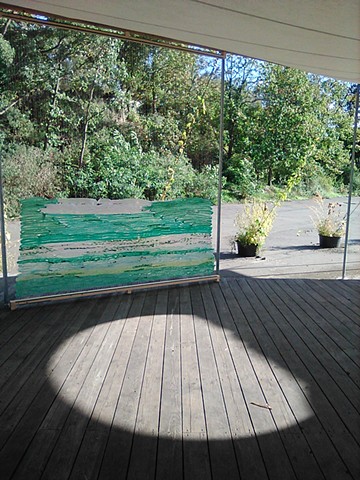-weaving walls {weaving the gaps}
radical weaving collaboration at Floating University Berlin, part of the ReEDOcate Me! Festival
Vom 17.10.22 - 20.10.22 – zwischen den beiden Wochenenden der öffentlichen Touren des Festivals – wird der postfossile Themenpark von ca. 50 Studierenden verschiedener Hochschulen besiedelt und als Experimentierraum genutzt.
Es wird ein Lern- und Workshopprogramm geben, unter anderem mit Künstler*innen des Themenparks, Ausflügen zum Biobauern, zur Terra-Preta-Produktion und in die Berliner Rieselfelder, auf denen die ersten Bäume für den “Wald des schlechten Gewissens” gepflanzt werden. Beteiligte Institute:
From 17.10. - 20.10. - between the two weekends of the public tours of the festival - the postfossil theme park will be populated by about 50 students from different universities and used as an experimental space.
There will be a learning and workshop program, among others with artists of the theme park, excursions to the organic farm, to the Terra Preta production and to the Berlin Rieselfelder, where the first trees for the "Forest of Bad Conscience" will be planted.
https://reedocate-me.com/Camp
2. weaving walls - mit Upsi (Künstlerin) sowie Nadia Fistarol (Bühnenbildnerin/ZHdK) und Lukas Sander (Bühnenbildner/ZHdK)
Neben minimalistischer Essenskultur und Kunst war die Schiebetür aus Papier eine der großen Inventionen der Edo Periode. EIne liehcte wand aus wenig Material die sowohl die Privatssphäre schützt als auch dieselbe vor Wind und teilweise auch vor Wetter. Sie isoliert zwar nicht lässt aber das Licht hinein und kann den Raum in der Garten erweitern. In der Workhsop wollen wir ein neues Material und eine neue Konstruktionsmethode für die Wände der Floating University erproben: aus recycelten Tüten aus der Lebensmittelindustrie werden wir gemeinsam mit der Künstlerin Upsi Wände um den Speisesaal weben.
Beside minimalistic Foodculture and Art, the sliding paper wall was one of the great inventions of the Edo period. A light wall which protects the privacy from wind and looks, but lets the light and the temperature come in. Like wise we will build some light panels in the workshop, but rather than making them from paper, we will recycle different coloured industrial plastic bags from the food industry and weave them together. The walls will be implemented at the reEDOcate me! restaurant. Together with the artist Upsi we will look towards the Edo period for inspiration concerning reuse, repair and minimizing waste of still valuable materials from the food supply chains.
this radical weaving collaboration is a part of the umbrella project > Transformation Station
Transformation Station is a nomadic safer-space for creative problem solving. The project invites participants to process excess plastic and fabric material through the technique of tapestry weaving. Salvaged material is both kept out of the waste processing system and implemented as raw material in teaching a new skill. The end goal of Transformation Station is to inspire a shift in behavior away from polluting consumerism and towards harm-reduction practices.
I currently offer Transformation Station at Haus der Materialisierung in Berlin where I build and maintain vertical-frame-looms, prepare materials and present the weaving process. Anyone can take part in weaving the current tapestry and learn how they might easily reproduce the loom setup at home.
Transformation Station encourages personal action in order to address our shared problem of excessive waste. This project shares an ancient skill which can turn our bodies into cleaners and conscious creators rather than polluters. The accessibility to learning weaving intentionally disregards the myth that only some people are (allowed to be) creative.
Tapestry weaving encourages a communal process in which people can contribute one by one. It does not matter who wove the last row, anyone can weave the next, they need only choose to take part.
///
Die Transformationsstation ist ein nomadischer sicherer Ort für kreative Problemlösungen. Das Projekt lädt die Teilnehmer dazu ein, überschüssigen Kunststoff und andere Stoffreste in der Technik des Webens zu einem Wandteppich zu verarbeiten. Das wiederverwendete Material muss damit nicht mehr im Abfallsystem entsorgt werden und kann es als Rohstoff für die Vermittlung einer neuen Fähigkeit eingesetzt werden. Das Endziel der Transformation Station ist eine Verhaltensänderung: Weg vom umweltschädlichen Konsumismus hin zur Praxis der Schadensvermeidung.
Derzeit biete ich die Transformationsstation an einem offenen Standorten in Berlin an. Dort baue und pflege ich vertikale Rahmenwebstühle und stelle den Webprozess vor. Jeder kann am Weben eines Wandteppichs teilnehmen und dabei lernen, wie er das Webrahmen-Setup zu Hause problemlos nachbilden kann. Das Weben von Wandteppichen ermöglicht einen gemeinsamen Prozess, bei dem jeder einzelne etwas beitragen kann. Es spielt keine Rolle, wer die letzte Reihe gewebt hat, jeder kann die nächste weben.
Die Transformationsstation ermutigt zum persönlichen Handeln, um unser gemeinsames Problem der maßlosen Verschwendung anzugehen. Es stärkt eine alte Fähigkeit, mit unserem Körper reinigend und bewahrend zu wirken anstatt zum Umweltverschmutzer zu werden. Die freie Zugänglichkeit zum Weben ignoriert absichtlich den Mythos, dass nur einige Menschen kreativ sein dürfen (können).
